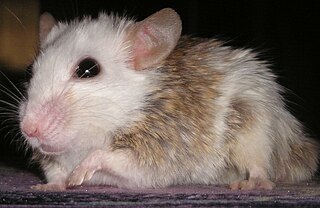
Peromyscus is a genus of rodents. They are commonly referred to as deer mice or deermice, not to be confused with the chevrotain or "mouse deer". They are New World mice only distantly related to the common house and laboratory mouse, Mus musculus. From this relative, Peromyscus species are distinguished by relatively larger eyes, and also often two-tone coloring, with darker colors over the dorsum (back), and white abdominal and limb hair-coloring. In reference to the coloring, the word Peromyscus comes from Greek words meaning "booted mouse". They are also accomplished jumpers and runners by comparison to house mice, and their common name of "deer mouse" is in reference to this agility.

Apodemus is a genus of Muridae. The name is unrelated to that of the Mus genus, instead being derived from the Greek ἀπό-δημος.

Reithrodontomys is the genus of groove-toothed New World harvest mice.

The eastern broad-toothed field mouse is a species of rodent in the family Muridae.

The Taiwan field mouse, also called Formosan wood mouse, is a species of rodent in the family Muridae. It is found only in Taiwan.

The least forest mouse is a species of rodent in the family Muridae. It is found only in the Philippines.
Habromys is a genus of rodent in the family Cricetidae, found in Mexico and Central America. It contains these species, all but one of which are threatened or endangered, five of them critically so. H. lophurus is near threatened.
The ranee mouse is a species of rodent in the family Muridae. It is restricted to the island of Borneo, in the provinces of Sarawak (Malaysia) and Sabah (Malaysia). Its natural habitat is subtropical or tropical dry forests.
The Minahassa ranee mouse is a species of rodent in the family Muridae. It is found only on the island of Sulawesi (Indonesia).

The lesser ranee mouse is a species of rodent in the family Muridae. It is found on the island of Borneo and the Palawan region (Philippines). Its natural habitat is subtropical or tropical dry forests.

Hybomys is a genus of rodent in the family Muridae endemic to Africa. It contains the following species:
Big-footed mice (Macrotarsomys) are a genus of rodent in the family Nesomyidae. It contains the following species:

Mastomys is a genus of rodent in the family Muridae endemic to Africa. It contains eight species:

Slevin's mouse, also known as the Catalina deer mouse, is a species of rodent in the family Cricetidae. It is endemic to Isla Santa Catalina off the east coast of Baja California Sur, an island with an area of about 40 km2 (15 sq mi), and it is the only native mammal on the island. It is named for Joseph Slevin, a curator at the California Academy of Sciences.

Pogonomys is a genus of rodent in the family Muridae, found in New Guinea and the D'Entrecasteaux Islands, with one species being found also in Australia.

The Hastings River mouse is a species of Australian rodent in the subfamily Murinae of the family Muridae. It is found only in Australia.

Steatomys is a genus of rodent in the family Nesomyidae. It contains the following species:
The dainty fat mouse is a species of rodent in the family Nesomyidae. It is found in Benin, Burkina Faso, Mali, Niger, Nigeria, and Senegal. Its natural habitat is subtropical or tropical dry shrubland.

Hydromyini is a very large, diverse tribe of muroid rodents in the subfamily Murinae. They are the dominant native rodents in Australasia and one of only two native rodent groups there, the other being the R. fuscipes group of the genus Rattus in the tribe Rattini. They are also found in parts of Southeast Asia.













